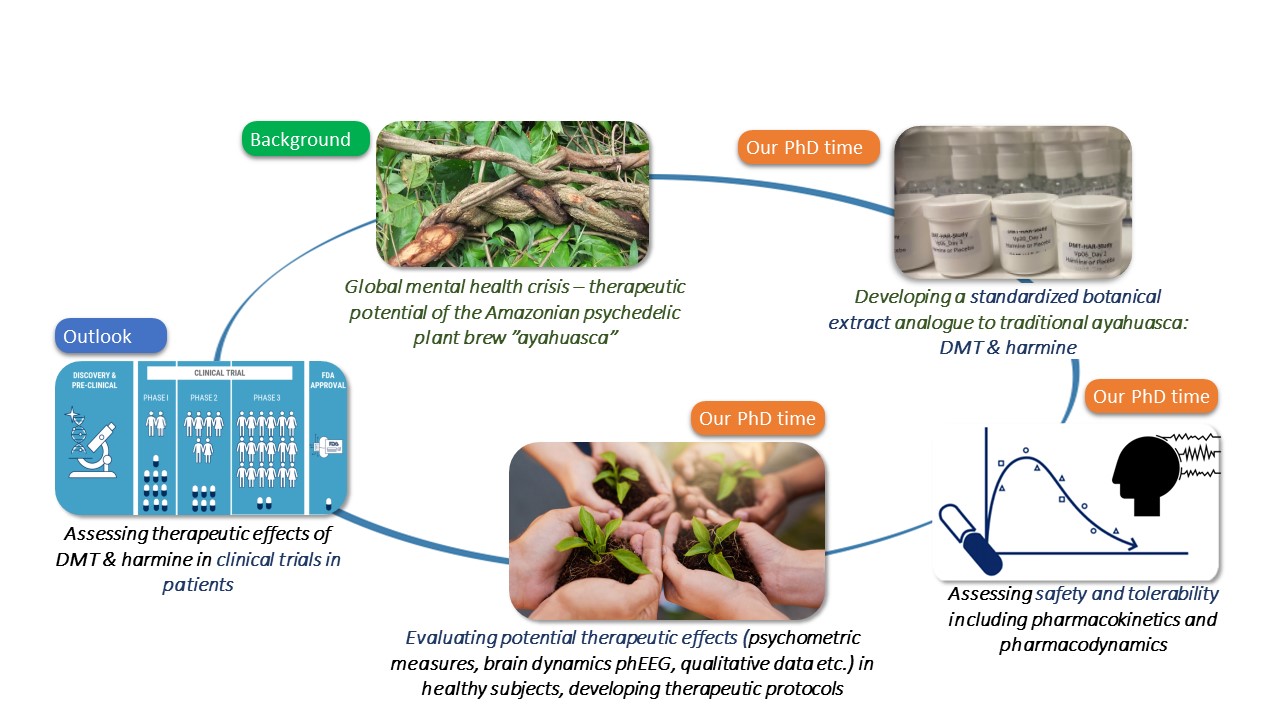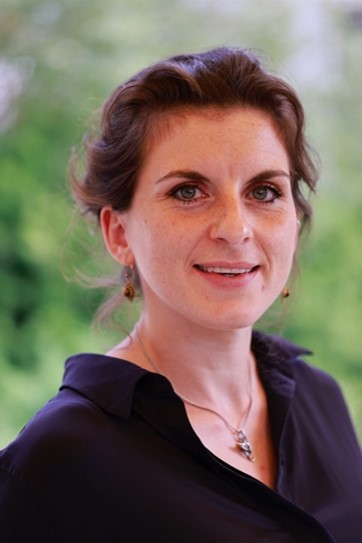HMZ Award 2023
The HMZ Award - The PhD team challenge for the year 2023 goes to Helena D. Aicher (UZH/PUK) and Michael J. Müller (ETH) for their project «Neurodynamics of Prosocial Emotional Processing Following Serotonergic Stimulation With N, N-Dimethyltryptamine (DMT) and Harmine in Healthy Subjects» at the Neuroscience Center Zurich (ZNZ). Congratulations to the team for this inspiring and truly interdisciplinary collaboration!
Our journey in interdisciplinary psychedelic research
Text by Helena D. Aicher and Michael J. Müller
As two researchers deeply immersed in the field of psychedelic science, we have teamed up to explore new territory beyond the usual limits of our fields (pharmacology and psychology). Together with a dedicated team (Psychedelic Research & Therapy Development Group and UZH Spin-Off Reconnect Labs), we developed and investigated a novel ayahuasca-inspired DMT/harmine formulation in a clinical phase 1 trial with healthy participants, exploring pharmacological, neurophysiological, and psychological effects, which potentially lays the foundation for the development of DMT/harmine as a treatment option for stress-related mood disorders such as depression or anxiety disorder. Our collaborative project is an ongoing testament to the potential and necessity of interdisciplinary research in understanding complex scientific phenomena.

A multidisciplinary approach and collaborative learning experience
Our work is situated at the intersection of neuroscience, pharmacology, and psychology. This convergence is not just a mere combination of fields; it is about how they interact, inform, and enrich each other.
From the pharmacological perspective, we studied the detailed actions of the psychedelic drug combination DMT/harmine, its metabolites, and effects on neurotransmitters and the whole body, which helps in understanding how these drugs could be applied safely and effectively. Our project involved not only pharmacokinetic and pharmacodynamic profiling but also an exploration of the neurophysiological responses to these substances. Simultaneously, we looked at the psychological aspects, focusing on the subjective experience and the psychological impact. This part of our research was driven by a curiosity to understand how these substances influence human consciousness and behavior, potentially offering new insights into potential alternative treatment options for mental health disorders.
The integration of methods and perspectives allows us to form a more comprehensive picture of the effects and potential of DMT/harmine formulations. Adopting a multidisciplinary approach has its unique set of challenges. It requires us to step out of our comfort zones, learn new methodologies, and constantly integrate diverse perspectives. However, the rewards of this approach are immeasurable. By combining our expertise, we can approach our research questions from a more holistic perspective, gaining a deeper understanding of the intricate relationship between psychedelic substances, the brain, the mind, and human consciousness.
Outlook
As we continue on this path, we are aware of the many unknowns that still lie ahead. Our journey is driven by a shared passion for discovery and a deep respect for the complexities of both the human mind and the substances we study. The initial findings of our research are promising, yet we approach the future with cautious optimism, knowing that each step forward brings new questions and challenges. After having completed our PhD programs, we are both still engaged in the further study and development of psychedelic molecules as potential treatments for mental health disorders.
Conclusion
Our experience in this collaborative project has been both challenging and highly rewarding. It has taught us the value of bridging different scientific domains, the power of joint exploration, and the importance of mutual learning, support, and friendship. We hope that our journey can inspire other young researchers to embrace interdisciplinary approaches, not only to enhance their research outcomes but also to contribute to a more integrated and comprehensive understanding of the world around us. This project is not just about the science of psychedelics; it is about how combining of diverse scientific disciplines can lead to greater insights and innovations.
Short Bio Helena D. Aicher

Helena's main academic background is in psychology (University of Zurich). Her journey has been marked by a blend of diverse experiences spanning research, teaching, and clinical practice. Her engagement at various departments at the Department of Psychology, coupled with her clinical work at the Psychiatric University Hospital Zurich (PUK) and a private group practice, have enriched her perspective in the field. At the Department of Neuropsychopharmacology and Brain Imaging, she studied the effects of psychedelics and meditation for her Master's thesis. Her PhD journey - funded by a ZNZ and an SNF Doc.CH grant - further deepened her exploration, focusing on the impacts of ayahuasca and ayahuasca-inspired formulations on personal and interpersonal dynamics, psychotherapy-relevant processes, underlying neuropsychological mechanisms, and contextual modulators. Embracing a multi-method approach, Helena's PhD work was a pursuit of knowledge but also a project of collaboration. Working closely with her colleagues within the Psychedelic Research and Therapy Development Group (Adult Psychiatry and Psychotherapy, Psychiatric University Hospital Zurich), she contributed to a body of work that underscores the importance of diverse academic perspectives in enriching scientific inquiry and advancing our understanding of complex psychological phenomena.
Building on the strong foundation of her interdisciplinary journey, Helena is currently involved in several trials in the Psychedelic Research and Therapy Development group Zurich and the Clinical Pharmacology and Toxicology Lab Basel, as well as clinical work with patients.
Short Bio Michael J. Müller

Michael has established a substantial foundation in pharmacology, complemented by a deep understanding of biochemical processes and their critical role in human health. This expertise was developed during his master's studies in molecular health science at ETH Zurich, where he gained comprehensive insights into the intricate workings of the body at a molecular level. His expertise was further strengthened during his PhD research, where he concentrated on exploring the effects of pharmacological substances on the human body. A significant part of his doctoral work involved investigating the pharmacokinetic and pharmacodynamics of psychedelic substances and their multifaceted impact on psychological health. His fascination with this area led him to delve into the intricate relationship between pharmacology and its influence on the human psyche. This pursuit encouraged a multidisciplinary approach in his PhD studies, integrating insights from various fields to enrich his research.
Leveraging his rich interdisciplinary background, Michael is now engaged in the private health sector as a product developer. Despite his transition, he maintains a close connection with his former research group, offering his expertise as an advisor and occasionally assisting with lab processes at various locations.